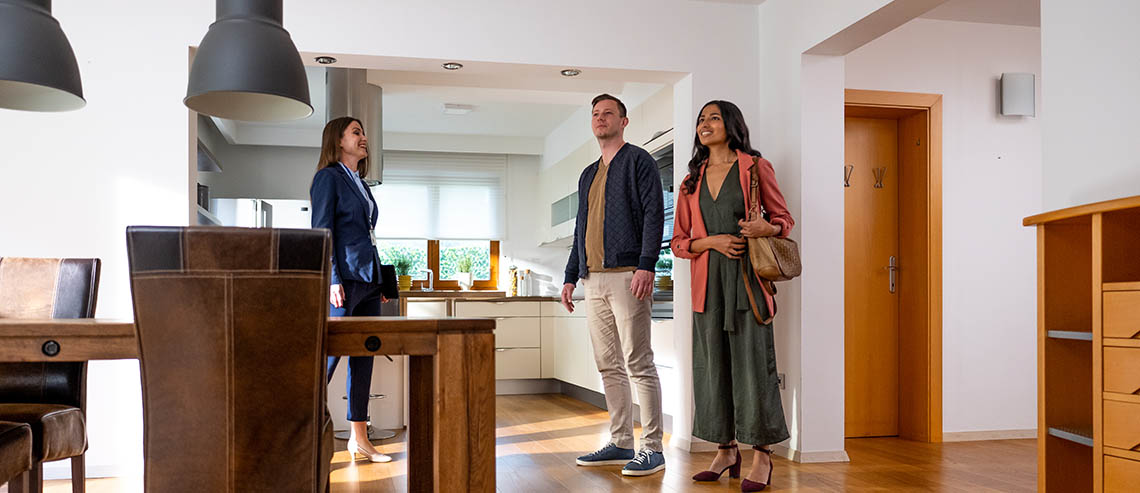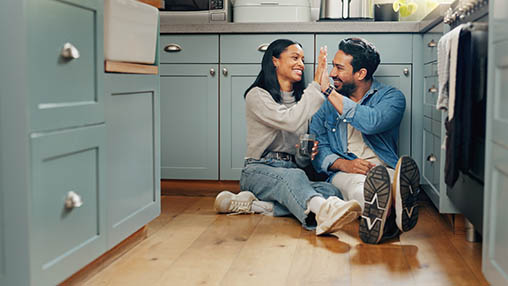
Earn cash back
after close!
With Home Connect, you could earn $350 to $9,500 cash back after close.
Many people know their main priorities when shopping for a home, such as the neighborhood or number of bedrooms and bathrooms. These factors are important, but there are many other features to consider. Let's explore some of the home features you might overlook.
What Features to Look for When Buying a House
Evaluating a variety of factors is essential to making an informed decision when buying a home. From pools to property conditions to future potential, here are some things to take into account as you shop for your perfect new abode.
Garages
More than parking spots, garages provide valuable storage and project space and protect vehicles from damage. When house hunting, think about whether you’d like an attached or detached garage.
Outdoor space
Consider your outdoor space as an extension of your home. Well-designed yards with landscaping and amenities can be great spaces for entertaining and are often much less expensive to create than comparable indoor entertaining spaces. Here are some yard elements to consider:
- Automatic sprinklers, drip system and misting system: Automatic sprinklers and drip systems can keep your yard looking lush for a low cost and are particularly valuable in dry climates. Misting systems can also keep you cool on hot days.
- Deck or patio: An outdoor surface makes it easy to enjoy your yard, and many new construction materials require little to no maintenance.
- Shed: Large, well-crafted and upscale sheds can go beyond storage to become functional spaces for everything from working on projects to working out.
- Fencing: Fencing adds an extra layer of security and privacy for you and your loved ones. A fenced-in backyard can be a great safety feature, especially if you have young children or pets.
- Play space: If you have your sights set on installing a swing set, swimming pool or tennis court or simply want to play catch with the kids, be sure the yard has enough space.
Pool and hot tub
Pools and hot tubs are perhaps the most controversial of all outdoor home features. Some homebuyers avoid pools at all costs, and some won’t look at a house without one. Which side are you on? Here are some factors to consider.
Pros
- If you like to swim for exercise or soak for muscle and joint pain, having your own pool or hot tub is convenient
- In hot climates where pools are common (i.e., Arizona, California, Florida, Texas), having a pool can significantly increase the resale value of your home
- Pools and hot tubs can be aesthetically pleasing
- Both are also useful for entertaining
- In warmer climates, pools provide a way to enjoy the outdoors comfortably
Cons
- Both pools and hot tubs require regular maintenance that includes chemicals, cleaning and repair
- Many families with small children do not want a pool at home due to safety concerns
- Your insurance cost may be higher and your utility bills may go up as well, particularly for heating a pool
- When it’s time to sell your home, some buyers will not want a house with a pool
Other amenities and extras
If you decide you’d like a pool or hot tub, consider if you’d also want:
- Pool heating
- Specialty pool lighting or water features
- An outdoor shower
- A sound system
- Shade and outdoor seating for entertaining or lounging
Do you desire a personal waterside oasis but don't need or want to swim? You can also add a pond, pondless waterfall or water garden. If you're house hunting, double-check to ensure the yard can accommodate these features.
Appliances and tech gadgets
As technology improves and designs continually evolve, it’s become increasingly important to have up-to-date appliances and other devices in your home.
If a home has older appliances, they could cost you more to run. Then, there may be homes that lack certain appliances altogether. Is your desired property missing a dishwasher, indoor laundry or other key features? If so, consider the added cost of installing or replacing what you need.
Smart devices: If you’re like many of today’s homebuyers, you may be looking for smart home devices, such as thermostats, fire detectors, carbon monoxide detectors, security cameras, door locks and doorbells. If a home doesn’t have these devices and you would like to have them in your home, you’ll need to add those expenses to your budget.
Driveway and parking
Walkways and driveways connect a home to the outside world and play a crucial role in a residence's curb appeal. Although often overlooked, they’re valuable features that can be messy and expensive to replace or update.
Do you prefer asphalt, concrete, pavers or another material? Depending on your climate, landscape and usage needs, one material may have benefits over another.
Also, consider the driveway size and shape. Do you want a uniquely shaped driveway or one with extra parking spaces? And speaking of parking, you’ll want to evaluate that as well. Does the home have sufficient garage, driveway or street parking to accommodate all current and future drivers in the household? Do you need space for large vehicles, like an RV? If you may want this at a later date, would your property allow for it?
Home size and layout
A home may have the ideal number of bedrooms and bathrooms, but it must also have a size and layout that will meet your lifestyle. Here are just a few considerations to think about while you search.
- Ensure that individual rooms are large enough for their intended use
- Does the layout support your daily activities? For example, do you want an open-concept layout so you can watch your children while you prepare meals? Or would you like more privacy with a closed layout?
- Does the home have sufficient storage space?
- Assess the amount of natural light each room receives
- Are the bedrooms all together on one floor or separated on different ones? This is something you may want to consider if you have a baby.
- Do you have mobility impairment, or the potential to have one in the future? This will impact your decision on a home with or without stairs, accessible bathroom facilities, wide hallways, etc. Some websites and real estate agents specialize in helping find accessible housing.
Property condition
While a home inspection is a critical part of the home-buying process, you should start your house search with a good idea of how much upfront work you’re willing to put into your new place.
Do you want a home in mint condition or are you open to a fixer-upper? What are your deal breakers and what can you live with?
Are you looking for a move-in ready home where you just have to unpack your things? Or do you want potential projects, like a kitchen renovation, where you can put your stamp on your new home and design it precisely the way you want?
Fixer-upper or money pit?
If you like the idea of a fixer-upper, do your due diligence. Get a thorough home inspection and a breakdown of which improvements are cosmetic versus structural. Outline your renovation vision and discuss it with a contractor so you can understand your budget. Always be sure to factor in a buffer for unexpected costs. You don’t want your new home to become a money pit.
Energy efficiency and sustainability
When house hunting, evaluate a potential home's energy efficiency and sustainability. Factors such as the following contribute to utility costs and environmental impact:
- Type and age of heating and cooling system: Is it modern and energy efficient?
- Insulation: Check the quality and extent of insulation in walls, attic and floors. Proper insulation helps maintain indoor temperatures, reducing heating and cooling costs.
- Building materials: Do you prefer homes built or renovated with sustainable materials like bamboo flooring, recycled steel or reclaimed wood? These materials have a lower environmental impact.
- Solar panels: Determine if the home has solar panels or the potential to install them. Solar energy can significantly reduce electricity costs and carbon footprint.
- Primary fuel source: Is it gas or electric? The type of fuel source used for heating, cooling and powering your home and appliances will impact energy bills and system efficiency.
Keep in mind that depending where you live and what types of efficiency improvements you make, you may be able to get tax credits and overall long-term savings.
Future potential
Considering a home's potential is vital to ensure it can adapt to your evolving needs and retain its value over time.
- Room to grow: While a home’s size may suit your current situation, consider the potential for requiring more space in the future. This could include adding extra rooms, a second floor or converting attics and basements into living spaces. Could the home’s structure support this? You’ll also want to check local zoning laws and building codes to ensure expansions or modifications are possible.
- Infrastructure: Ensure the home has the infrastructure (like wiring) to support future technological upgrades. If it doesn’t, understand the potential costs and complexities of upgrading.
- Market trends: If you plan to stay in your home for just a few years, research the area's current and forecasted real estate market trends. A home in a growing or desirable neighborhood is more likely to appreciate in value.
Use these tips, then land your new home
Although these features may not be your first considerations in the house-hunting process, they are important elements that you will use or interact with nearly every day. Carefully assess your must-haves and nice-to-haves and embark on your home search with confidence. If you’ve found your ideal home that ticks all the boxes, contact a Pennymac Loan Expert today to discuss your mortgage options. Happy house hunting!
Share
Categories





